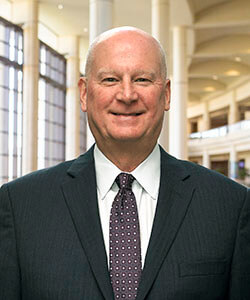
Mark Tester
On Feb. 10, the Orange County Convention Center (OCCC) welcomed Mark Tester as its new executive director. Tester joins the OCCC after spending 12 years shaping Austin’s rise in the meetings industry, serving as the director of the Austin Convention Center Department and sitting on the executive committee of Visit Austin.
Having hosted the blockbuster SXSW for years, Tester is no stranger to events on a grand scale. He’s ready for the supersized responsibilities that come with a building that welcomes more than 1.5 million attendees each year and is gearing up for a $605-million expansion. Convene caught up with Tester on his fourth day on the job to hear what he’s most looking forward to in his new digs.
What were the key factors that shaped this career move for you? Why did now feel like the right time to make the move to Orlando?
It was all about the opportunity here in Orange County. I’ve always admired the job they have done as the second-largest convention center in the U.S. So many customers can utilize this building in so many different configurations. After 13 years in Chicago and 12 years in Austin, the opportunity to work with some of the bigger events again and with some of my old friends was really exciting. The expansion and campus-wide plan that will move this facility forward was something I really wanted to be part of.
What most excites you about the next phase of development at the center?
The project is scheduled to break ground this fall, and it has a couple of key elements that will make the North-South building operate even more efficiently with so many opportunities for different customers to fit and utilize it. There will be a 200,000-square-foot multipurpose hall, which allows a lot of flexibility for general sessions for corporate groups and national associations. Corporate groups can also use it for product demonstrations, and it can also serve as additional exhibit space.
There is a grand concourse that will connect the two buildings. That will make the flow better, but there are also more opportunities to put programming in the public space. As event organizers try to cater to Millennials and Gen Z, that space will be perfect for the kinds of casual programming and casual networking that has become so important to events.
Looking back at your career so far, what are the most valuable lessons you’ve learned?
One of the most important lessons that has helped me move forward is to be an advocate for the customer. I grew up in sales and marketing, and in my convention career, it’s proved to be essential to determine what makes the best sense for the customer, their attendees, and their exhibitors. In Austin, I know we wanted to be as flexible as we could, and I know that’s a trait of [the culture in] this building. Every customer is different, and it’s important to take away as many of the barriers as possible to fuel their individual success.
It’s also important to not be afraid of having the tough conversations when issues arise — to be as compassionate and caring as possible. This industry is built on relationships, and you want to have a long-term relationship with everyone you meet.
Outside of Orlando, let’s talk about the events industry as a whole. What are the biggest challenges and opportunities that lie ahead for meetings and conventions?
Competition. Every destination has a beautiful convention center and a good hotel package — or they’re working on to improve it. So you have to always continue to improve and refine your offering. It’s important to look at innovative ways to integrate technology, too. Any major player in the convention industry needs to continue to evolve and be innovative.
The industry is changing as Millennials and Gen Z come into the market. Meetings are looking to adjust to make sure they are relevant. There are a lot of talent shortages in a lot of industries, and meetings are becoming a big place to recruit and develop talent. I have seen many organizers looking at ways to utilize their events as a catalyst to welcome new talent. We need to make sure that these experiences can play a major role in succession planning efforts across all industries.
This interview was edited for brevity.
